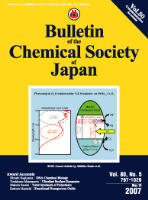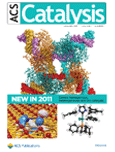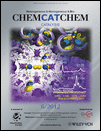
Catalysis in Industry
Scope & Guideline
Empowering researchers to transform chemical engineering.
Introduction
Aims and Scopes
- Catalytic Mechanisms and Kinetics:
Research emphasizing the understanding of reaction mechanisms and kinetics in catalysis, providing insights into how catalysts function at a molecular level. - Development of Novel Catalysts:
Focus on the synthesis and characterization of new catalytic materials, including metal-based, biocatalysts, and hybrid systems to enhance catalytic efficiency. - Industrial Applications of Catalysis:
Exploration of the practical applications of catalysts in industrial processes such as petrochemical refining, biomass conversion, and chemical manufacturing. - Environmental Catalysis:
Studies aimed at developing catalytic processes that reduce environmental impact, including CO2 conversion, waste management, and green chemistry approaches. - Catalyst Deactivation and Regeneration:
Investigation into the deactivation mechanisms of catalysts and methods for their regeneration, ensuring sustainability in catalytic processes. - Biocatalysis and Green Chemistry:
Research on the use of enzymes and other biological materials as catalysts, highlighting sustainable methods for chemical synthesis.
Trending and Emerging
- Sustainable Catalysis and Green Chemistry:
There is a marked increase in research related to sustainable practices in catalysis, including the use of renewable feedstocks and eco-friendly solvents, aligning with global sustainability goals. - Catalysts for Hydrogen Production and Storage:
Emerging research on catalysts aimed at hydrogen production from renewable sources and efficient hydrogen storage solutions reflects the growing importance of hydrogen as a clean energy carrier. - Microalgae and Biomass Conversion:
A significant trend towards utilizing microalgae and other biomass sources for the production of fuels and chemicals is evident, emphasizing the journal's commitment to renewable energy solutions. - Advanced Characterization Techniques:
The integration of advanced characterization techniques (such as in situ spectroscopy and microscopy) in catalyst development is gaining traction, allowing for deeper insights into catalyst behavior and performance. - Integrated Catalytic Processes:
An increase in research focusing on integrated catalytic processes, combining multiple catalytic reactions in a single framework, indicates a trend toward more efficient and streamlined production methods.
Declining or Waning
- Traditional Homogeneous Catalysis:
Research focusing on homogeneous catalysis has decreased, possibly due to a shift towards heterogeneous systems that offer easier separation and reuse. - Basic Theoretical Studies:
The emphasis on purely theoretical studies without practical applications is waning, as the journal increasingly favors research with direct industrial relevance. - Catalysis in Fine Chemicals:
The specialization in catalysts for the production of fine chemicals is becoming less prominent, with more focus shifting towards bulk chemical production and renewable resources. - Single-use Catalysts:
Research on catalysts designed for single-use applications is declining, as there is a growing trend towards the development of recyclable and multifunctional catalyst systems.
Similar Journals

BULLETIN OF THE CHEMICAL SOCIETY OF JAPAN
Fostering Excellence: Where Chemistry Meets KnowledgeBULLETIN OF THE CHEMICAL SOCIETY OF JAPAN, published by the esteemed Chemical Society of Japan, serves as a pivotal platform for the dissemination of cutting-edge research in the multifaceted field of chemistry. With an ISSN of 0009-2673 and an E-ISSN of 1348-0634, this journal has been integral in fostering the growth of chemical sciences globally since its inception in 1965. The journal holds an impressive Q2 ranking in the Chemistry (miscellaneous) category, indicating its relevance and influence within the academic community, as reflected by its Scopus rank of #104/408, placing it in the 74th percentile. Although it is not an open-access journal, its rich content, which spans a wide range of topics in general chemistry, remains highly valued by researchers, professionals, and students alike, affirming its crucial role in advancing both theoretical knowledge and practical applications in chemistry. As it converges towards 2024, the bulletin continues to uphold its commitment to excellence in scientific communication and research dissemination in Japan and beyond.

KINETICS AND CATALYSIS
Advancing Catalytic Science for Tomorrow's InnovationsKinetics and Catalysis is a pioneering journal dedicated to advancing the field of catalytic science and chemical kinetics, published by Pleiades Publishing Inc. Based in the Russian Federation, this journal serves as a critical platform for disseminating high-quality research related to the mechanisms of chemical reactions and innovative catalytic processes. Although currently not an open access journal, it maintains academic rigor through a comprehensive peer-review process that ensures the relevance and integrity of its published works. With a history dating back to 1968, Kinetics and Catalysis has evolved through various converged years, reflecting its commitment to interdisciplinary research within the realms of chemistry, catalysis, and the computational aspects of modeling and simulation. As evidenced by its Scopus rankings and quartiles, it stands as an influential, albeit niche, journal, appealing to researchers, professionals, and students eager to explore the intricacies of chemical transformations. The journal’s robust archive offers an invaluable resource for those seeking to expand their understanding of both theoretical and practical approaches to catalysis.

ACS Catalysis
Driving Excellence in Catalysis and ChemistryACS Catalysis, published by the American Chemical Society, stands as a premier journal in the field of catalysis, offering a vital platform for researchers, professionals, and students focused on advancing the science of catalysis and its applications. With an impressive impact factor placing it in the Q1 category for both Catalysis and Chemistry (miscellaneous), this journal has established itself as a leading source of high-quality research findings, currently ranking #21 out of 408 in General Chemistry and #9 out of 68 in Catalysis according to Scopus. Since its inception in 2011, ACS Catalysis has aimed to publish innovative research that addresses the critical challenges in catalytic processes, advancing our understanding of both fundamental and applied aspects of catalysis. With a commitment to promoting open scientific discourse, it serves a vital role for those interested in the latest methodologies, discoveries, and trends in this essential discipline. Based in Washington, DC, ACS Catalysis continues to uphold the highest standards of scholarship and collaboration within the vibrant community of chemists and engineers worldwide.

RESEARCH ON CHEMICAL INTERMEDIATES
Championing Excellence in Chemical ResearchRESEARCH ON CHEMICAL INTERMEDIATES, published by Springer, is a prestigious academic journal that has been contributing to the field of chemistry since 1984. With an ISSN of 0922-6168 and an E-ISSN of 1568-5675, this journal serves as a vital platform for the dissemination of innovative findings and research advancements related to chemical intermediates. Situated in the Netherlands, it has established a commendable reputation, currently ranked in the Q2 category for miscellaneous chemistry and positioned at #131/408 with a 68th percentile in the Scopus rankings. Though it does not operate under an open-access model, the journal plays a crucial role in connecting scientists, researchers, and practitioners to facilitate a better understanding of synthetic methods, characterizations, and applications of various chemical intermediates. Continually publishing high-quality research until its anticipated convergence in 2024, this journal is an essential resource for those looking to expand their knowledge and contribute to the vibrant community of chemical science.

International Journal of Chemical Engineering
Fostering breakthroughs in chemical engineering methodologies.International Journal of Chemical Engineering is a leading peer-reviewed journal published by HINDAWI LTD, dedicated to advancing the field of chemical engineering through innovative research and practical applications. With an impact factor that places it in the Q2 category of Chemical Engineering (miscellaneous), this journal has established itself as a significant resource for researchers and professionals alike, particularly those interested in general chemical engineering topics. Since its transition to Open Access in 2008, the journal has ensured that critical scientific knowledge remains accessible to a global audience, fostering collaboration and interdisciplinary research. With coverage from 2009 to 2024, it continues to be an essential platform for disseminating cutting-edge findings, methodologies, and discussions that shape the future of chemical engineering. For more information, visit their website or access the latest issue directly to explore groundbreaking studies and insights.

CATALYSIS SURVEYS FROM ASIA
Advancing Catalytic Knowledge from Asia's Finest MindsCATALYSIS SURVEYS FROM ASIA, published by Springer/Plenum Publishers, is a vital resource in the ever-evolving field of catalysis and chemistry. With a dedication to publishing innovative research and reviews from 2002 to 2024, this journal serves as a platform for the dissemination of significant findings that enhance our understanding of catalytic processes and their applications. Although its current impact factor is not explicitly listed, the journal holds a commendable Q3 ranking in Catalysis and Q2 ranking in Miscellaneous Chemistry within the prestigious Scopus database, indicating its relevance and quality among its peers. Open access options ensure that a broader audience can benefit from the research published, fostering collaboration and advancement in the field. By bridging the gaps between academic research and practical applications, CATALYSIS SURVEYS FROM ASIA is indispensable for researchers, professionals, and students committed to pushing the boundaries of catalytic science and technology.

APPLIED CATALYSIS A-GENERAL
Unleashing Potential: Where Catalysis Meets Technology.Applied Catalysis A-General is a premier journal published by Elsevier that serves as a vital resource in the fields of catalysis, process chemistry, and technology. Founded in 1991, this esteemed journal has garnered considerable recognition, reflected in its classification in the Q2 quartile for both catalysis and process chemistry in 2023, as well as its notable rankings within the Scopus database, placing it among the top 20 journals in related disciplines. With an ISSN of 0926-860X and an E-ISSN of 1873-3875, the journal provides a platform for researchers and professionals to disseminate cutting-edge research findings, facilitate knowledge transfer, and foster innovation in the field. While not an open-access journal, it remains accessible through institutional subscriptions, ensuring that critical findings reach a broad audience. The journal's objectives include advancing the understanding of catalytic processes and their applications, making it an indispensable tool for those engaged in this dynamic area of study. Applied Catalysis A-General continues to play a vital role in shaping the future of catalysis, contributing to both scientific progression and practical advancements in various industries.

CATALYSIS REVIEWS-SCIENCE AND ENGINEERING
Exploring Breakthroughs in Catalytic Science and TechnologyCATALYSIS REVIEWS - SCIENCE AND ENGINEERING, published by Taylor & Francis Inc, is a leading journal in the field of catalysis, providing a vital platform for the dissemination of rigorous research and comprehensive reviews from 1968 to the present. With an impressive Q1 ranking in multiple categories, including Catalysis and Chemistry, this journal stands out as an essential resource for professionals, researchers, and students alike. Its high impact factor and esteemed Scopus ranks — including 3rd in Chemical Engineering: Process Chemistry and Technology — highlight the journal's influence and prestige within the scientific community. While primarily a subscription-based publication, the journal’s commitment to advancing the understanding of catalytic processes continues to foster innovation in various industrial applications, making it indispensable for anyone engaged in the fields of chemical engineering and applied chemistry.

ChemCatChem
Elevating Chemical Understanding Through Rigorous Research.ChemCatChem is a leading international journal published by WILEY-V C H VERLAG GMBH that has been making significant contributions to the fields of catalysis, inorganic and organic chemistry, as well as physical and theoretical chemistry since its inception in 2009. With an established reputation for excellence, this journal holds commendable rankings in various categories, including Q1 in Inorganic Chemistry and Q1 in Organic Chemistry, demonstrating its pivotal role in advancing scientific knowledge and innovation. Notably, it has achieved a high Scopus ranking, securing 10th place out of 79 in Inorganic Chemistry, among others, showcasing its influence and quality. Although open access options are not available, the journal offers cutting-edge research articles, reviews, and insights that are vital for researchers, professionals, and students aiming to stay at the forefront of chemical science. With its address rooted in Weinheim, Germany, and convergence projected to continue until 2024, ChemCatChem remains a dynamic platform for disseminating vital advancements within the chemical community.

JACS Au
Empowering the global scientific community with groundbreaking research.JACS Au, published by the American Chemical Society, is a premier open access journal dedicated to advancing research in the rapidly evolving fields of analytical chemistry, organic chemistry, and theoretical chemistry. Since its inception in 2021, JACS Au has quickly established itself as a leading platform for high-quality research, reflected in its Q1 rankings across multiple categories for 2023, including Organic Chemistry and Analytical Chemistry. The journal focuses on innovative methodologies and applications that drive the discipline forward, making it an essential resource for researchers, professionals, and students alike. With an impressive Scopus ranking, consistently placing in the top tiers of its categories, and offering a broad range of access options for its readership, JACS Au aims to foster collaboration and disseminate transformative ideas that impact the global scientific community. Exploring diverse topics within chemistry, this journal provides a vital conduit for sharing groundbreaking research and enhancing scientific dialogue.